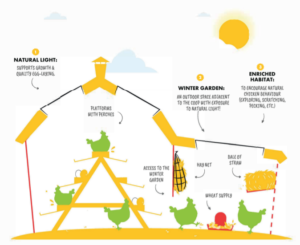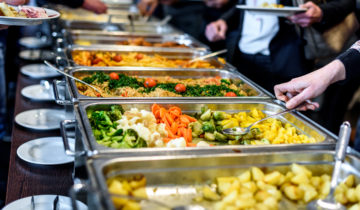Although local sourcing is the norm, it is typically unable to cover all the needs of the dining and institutional catering sectors. Due to the significant increase in demand for quality egg products, requiring substantial egg production levels, calibrated processing units and elaborate processes, some supplies must necessarily be procured from abroad. And yet, it would be out of the question to compromise on food safety or flavour or on production conditions, about which consumers are becoming increasingly mindful.
Demand for quality
It’s a fact: diners expect to be told about the provenance and production conditions of the products they consume. This change is associated with greater awareness of the impact of their dietary habits on the environment and animal welfare. The watchwords: information and transparency. The rising popularity of vegetarianism and flexitarianism has certainly contributed to this. Given that 28% of British people identified as flexitarians in 2017, it is easy to see the magnitude of this trend, which has only grown over the years.
The desire to diversify sources of animal proteins goes hand in hand with the surge in awareness of animal welfare. The combination of these two societal expectations affects household consumption just as much as it does the dining and institutional catering sectors.
Promoting ingredients
Views of egg products are based on a multitude of aspects: the eggs’ naturalness, local or regional production, health benefits, etc. In response to expectations and critical perceptions, restaurateurs must be able to prove the provenance of their products and the conditions under which they were prepared. When local sourcing is unable to satisfy demand, we have to turn to our trusted partners.
But the use of foreign products does not necessarily mean a decline in quality. On the contrary, European regulations and the various available certifications (BRC, GFSI, FSSC 22000, etc.) provide further assurances which can be communicated to diners. They also make it possible to ensure compliance with HACCP procedures, lifelong learning for staff members and the optimization of logistics. In France, over and above the inspections carried out by government agencies, adherence to these guidelines is monitored. From farm to table, all actors on our French value chain are committed to supplying only products of the highest quality.
As a co-operative with control over that entire chain, Cocotine is able to guarantee flawless traceability. We process our farmers’ eggs and entrust our egg products to certified transporters who have signed our Quality Charter. Committed as they are to animal welfare, Cocotine’s farmers are set to put an end to caged chicken farming (Code 3), making way for enhanced Code 2 (animal welfare) farming, in partnership with the NGO WelFarm. This means that, going forward, all our chickens will have space, access to a winter garden and be free to engage in natural behaviours (like roosting, scratching the ground, and so on).

To satisfy diners’ taste expectations and concerns about farming conditions, restaurateurs need to offer them high quality food. Cocotine provides consistent, proven quality thanks to our different certifications which guarantee our transparency and the traceability of our egg products.
Take look at our infographic showing our assessment of alternative farming in Europe
What is the distribution of alternative and organic farms in Europe? Find out in our infographic.






